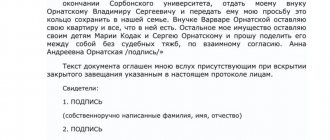Respecting traditions and customs, people must see off a deceased person on their journey with dignity. Funeral expenses are borne by the immediate family, who, according to the law, become heirs. All expenses are shared by the heirs or reimbursed within the limits of the value of the inheritance.
In accordance with civil law, heirs reimburse the following expenses:
- Pre-mortem illness of the testator;
- Funeral;
- Burial;
- Protection and management of inheritance;
- Execution of a will (for example, payment of state fees at a notary).
Our inheritance lawyer will help you with the issue of compensation for funeral expenses, draw up a claim and represent your interests in court: professionally, on favorable terms and on time!!!
What are the necessary expenses for organizing a decent funeral?
According to judicial practice, the necessary expenses for organizing a decent funeral include funeral services:
- ordering funeral supplies
- production and installation of a tombstone on a grave
- hearse transport services, service team, etc.
These usually do not include the costs of organizing a wake (on the 9th and 40th day), landscaping the grave and purchasing a place for a family burial.
The necessary expenses for the treatment of a dying illness include payment for the services of doctors and nurses (including surgery), and the purchase of necessary medications. Only the costs of treating the disease that was the direct cause of death are compensated. Expenses for the treatment of other diseases that the deceased suffered in the last days before death are not included in the list of necessary expenses.
How to get back money spent on a funeral?
Often, the person who paid for the funeral wants to get their money back. You can return money in different ways and from different persons, for example, from heirs and the state.
- Reimburse your expenses from your heirs, as described above.
- Receive your money from the state in the form of compensation.
- If there are disagreements with the parties, you can get your money back through the courts (often disputes between heirs about the distribution of inheritance shares make it difficult to quickly receive expenses, so we recommend that everything be resolved in one process).
The state, based on the legislation on funeral business, can offer 2 options, a social benefit for burial or funeral services. If a person chooses the services of a funeral home, he will not be able to receive a funeral benefit, since he has already received free services from the state.
In order to return money from the state spent on a funeral, it is necessary to determine the status of the deceased, whether he was an employed citizen or not, a veteran, a pensioner, a child, etc. after all, depending on his status, it will be necessary to determine where to apply for payment of social benefits.
To get your money spent on a funeral back through the court, you need to draw up a claim for reimbursement of funds and go to court with the collected evidence.
Who pays for expenses incurred?
Compensation is paid through inheritance. This means that the payment falls on those who currently manage or dispose of the inherited property. Who exactly pays compensation depends on whether the inheritance was accepted.
- If the inheritance was not accepted, then compensation for the expenses incurred is paid by the executor of the will (if the executor was appointed by the will or decision of a notary);
- If the heirs have assumed their rights, then the payment of compensation falls on them.
A person who has incurred expenses and wishes to receive compensation must contact a notary. An application for compensation for necessary expenses must be submitted in writing. All costs indicated in the application must be confirmed in the form of invoices and checks.
After considering the application, the notary decides to issue a compensation order, which will be transferred to the heir/s or executor of the will. In case of controversial issues (refusal of the notary to make such a decision, refusal of the heirs to pay the expenses), the person who incurred the expenses should go to court. The compensation received should not exceed the amount of the inheritance.
Is it possible to pay for a funeral with money from an inheritance?
If the basis for bequeathing funds was a testamentary disposition (Article 1128 of the Civil Code of the Russian Federation), then within a six-month period from the opening of the inheritance, the heir can receive from the testator’s account or contribution the amount necessary for his funeral. It is worth noting that the certification of such an order is carried out not by a notary, but by employees of the bank in which the testator’s account/deposit is located. In addition to this order, the heir must present to the bank the death certificate of the testator. A similar procedure for receiving money by testamentary disposition has been in effect since March 1, 2002. If the testamentary disposition is drawn up before this time, the bank must issue the deposit in full. Heirs and other persons should know that they can receive from that part of the money included in the inheritance (including deposits and accounts of the testator) an amount of 100 thousand rubles to reimburse the costs of organizing a decent funeral for the testator (Article 1174 of the Civil Code of the Russian Federation in as amended by the Federal Law of February 19, 2016 “On Amendments to Article 1174 of the Civil Code of the Russian Federation”). Making a claim for reimbursement of expenses associated with the funeral of the testator before accepting the inheritance is possible on the basis of a decree or testamentary disposition made by a notary in relation to the inherited property or to the executor of the inheritance (Article 69 of the Fundamentals of the Legislation of the Russian Federation on Notaries). The demand will be addressed to the heirs who accepted the inheritance. In the case of an escheated inheritance (which is not accepted), reimbursement of expenses is carried out at the expense of the Russian Federation. Reimbursement for funeral expenses occurs in an amount not exceeding 100 thousand rubles, but it cannot exceed the value of the inheritance. The entire amount spent on organizing the funeral is subject to documentary confirmation.
How are expenses reimbursed?
According to Article 1174 of the Civil Code of the Russian Federation, any inherited property of the deceased can be used to pay expenses. If the heirs do not have the required amount, the inherited property can be sold (sold) to pay compensation.
Funeral expenses are reimbursed from cash deposits and accounts of the deceased. To receive compensation, you need to contact the bank with a notary's decree, documents confirming the expenses incurred and a stamp of death certificate.
The heir who has undertaken the organization of the funeral can receive money for the organization of the funeral from the bank accounts of the deceased before the expiration of a six-month period (the period of entry into the inheritance). To do this, he needs to contact the bank with a copy of the will and a stamp of death certificate. The maximum amount that can be withdrawn in this way is RUB 100,000.
Funeral compensation
Social benefits for burial are regulated by federal laws and regulations. Based on the laws, a spouse, close relative, legal representative and other relatives who have taken responsibility for carrying out a funeral at their own expense can receive a social benefit for burial from the state, but not more than 4,000 (Four thousand) rubles, with subsequent indexation once per year. year, that is, an increase in consumer prices and services. For example, for 2021 the indexation amount is 5701.31 rubles.
You can receive compensation for burial on the day of application on the basis of a death certificate (death certificate). The benefit can be obtained from the following authorities:
- In the body in which the deceased received a pension (if the citizen was a pensioner);
- At work for an employer, if you were officially employed, and he was your insurer, in case of disability and there were contributions to the Pension Fund of the Russian Federation;
- In the social body for the protection of the population (employment center), if the deceased was not an employed worker (also in the case of a stillbirth after 154 days of pregnancy);
- in the Social Insurance Fund of the Russian Federation in which the deceased was registered as an insurer;
A citizen can receive social benefits no later than six months from the date of application to the special authorities indicated above.
Documents that need to be collected to receive compensation:
- Application for benefits;
- Identity card (passport);
- Death certificate;
- The documents are the main ones to provide, but you also need to keep in mind the status of the person, as other additional documents may be needed, for example, a military or pension certificate, a certificate from the employment service, a certificate from the antenatal clinic.
Procedure for reimbursement of expenses
Compensation for necessary expenses is not considered the debts of the testator and is paid before them. Article 1174 establishes the following procedure for paying compensation for expenses incurred for:
- Organizing a decent funeral and treating the disease that led to death;
- Protection and management of inheritance;
- Forensic notarial services.
In some cases, this order is violated, and the testator's creditors are the first to apply for debt compensation. If such a situation arises, then to obtain the required compensation for the necessary expenses, you should go to court.
Is it possible to pay for a funeral with money from an inheritance?
The notary will have to check the presence of heirs, send a request to the bank about the amount of funds in the testator’s accounts or deposits, as well as the fact of opening an inheritance case. After this, the application is subject to registration in the manner prescribed by law and is the basis for opening an inheritance case (if it has not yet been opened at the time of filing). The notary issues a resolution in accordance with the form adopted by Order of the Minister of the Russian Federation No. 99 of April 10, 2002. When making a decision, documents already available in the case confirming the right of inheritance are taken into account. To receive funds, you must contact the bank with a resolution. If the basis for bequeathing funds was a testamentary disposition (Article 1128 of the Civil Code of the Russian Federation), then within a six-month period from the opening of the inheritance, the heir can receive from the testator’s account or contribution the amount necessary for his funeral. It is worth noting that the certification of such an order is carried out not by a notary, but by employees of the bank in which the testator’s account/deposit is located. In addition to this order, the heir must present to the bank the death certificate of the testator. A similar procedure for receiving money by testamentary disposition has been in effect since March 1, 2002. If the testamentary disposition is drawn up before this time, the bank must issue the deposit in full.
The city ritual service Ritual.ru stores all documentation about completed orders
In the case of organizing a worthy funeral, expenses are confirmed by a completed and signed Agreement for the provision of funeral services and Specifications, from the funeral service and a cash receipt. The city specialized funeral service Ritual.ru is legally required to keep an archive of documentation about completed orders. This ensures that in the event of a dispute, the customer will receive all the necessary documents to pay the required compensation.
You might be interested:
- Money for funeral
- Heirs' rights
- Contract for the provision of funeral services
June 28, 2018
Payments and benefits paid after the death of a person
There are various payments and benefits that are paid after the death of a person. One type of compensation after the death of a relative is a funeral benefit, that is, payment for funeral services performed. It is assigned regardless of the degree of relationship or social affiliation of the deceased, and is paid in a lump sum in a fixed amount. After the death of older people, they often have deposits in Sberbank that were opened before June 20, 1991 . If your relative had such a deposit, you can count on an additional payment of 6 thousand rubles. Contact your nearest Sberbank branch.
Another comment on Art. 1174 of the Civil Code of the Russian Federation
1. The commented article regulates the procedure for reimbursement of expenses incurred before or after the death of the testator, which are subject to reimbursement from his property until the claims of the deceased’s creditors are satisfied.
The article names several types of expenses subject to reimbursement, which can be combined into several groups: expenses caused by the dying illness of the testator; expenses for his dignified funeral; expenses for the protection and management of the inheritance and expenses for the execution of the will.
It does not matter who carried out these expenses, with the exception of expenses of the third group, which are made by persons specified in the law.
Expenses caused by the decedent's dying illness may include expenses for medications, medical care, care expenses, etc. It should be borne in mind that only necessary expenses are subject to compensation in accordance with the commented article. In the event of a dispute, the question of the need for certain expenses, as well as their justified amount, at the request of the parties, can be decided by the court.
In addition, the commented article directly states that those expenses that were caused by a near-death illness are subject to reimbursement, which, in particular, can be determined by the conclusion of doctors. However, the use of the concept of “dying illness” does not allow us to definitely answer some questions, including the amount of compensation. It is not clear, for example, whether a chronic illness from which the testator has suffered for a long time can be considered pre-mortem? To what extent can the costs of medical care and care for a sick testator be reimbursed to the person who incurred these expenses, if the testator, being the owner of certain property, but not having sufficient funds, was actually a dependent of this person, and the amount of compensation is limited only by the cost of the inheritance? It seems that the answers to these questions will be given by judicial practice.
In the commented article, the amount of expenses for a decent funeral is not limited by anything other than the cost of the inheritance itself. However, such a situation would entail an inevitable clash of interests of the heirs, creditors of the deceased and persons paying funeral expenses. Therefore, apparently, the court will apply the principle of reasonableness when determining the permissible amount of such expenses.
The commented article establishes a limit on the amounts issued by the bank for funerals in the amount of 100 minimum wages established on the day of application (clause 3 of the commented article). This limitation only applies to funeral expenses. Other expenses may apply to the extent of the estate.
Limitations on the amounts that can be issued by the bank for a funeral also do not apply to expenses exceeding these amounts that are actually spent on the funeral and are subject to reimbursement from the cost of the inheritance.
The protection of inheritance (if established) and its management are also associated with certain costs on the part of the obligated persons. Such expenses are also subject to compensation from the value of the inheritance, as well as expenses that may arise in connection with the execution of the will.
This is interesting: Cancellation of a testamentary disposition 2021
2. Interested parties have the right to present their claims for reimbursement of expenses at any time, both after the acceptance of the inheritance by the heirs and before. Moreover, if the inheritance has not yet been accepted by the heirs, the interested person has the right to contact the executor of the will or the notary at the place where the inheritance was opened to satisfy his claims without the participation of future heirs.
If it is necessary to incur expenses for the testator's funeral, they can, by decision of the notary, be made immediately at the expense of the estate.
If the inheritance has already been accepted by the heirs, each of them is liable for the specified debts within the limits of their part of the inheritance, but in equal proportion with the other heirs. It does not matter from what amounts the heirs reimburse expenses. If the heirs do not have the necessary or sufficient funds, then the testator’s property is subject to sale. Expenses are reimbursed from proceeds. If the inheritance has not yet been accepted, the specified expenses are reimbursed from it and the remaining property is transferred to the heirs.
At the same time, the law guarantees the receipt of the sums spent from the value of the inheritance, even if it is burdened with debts. The law establishes the order of reimbursement of expenses.
The amount of expenses caused by the illness and funeral of the testator must first be reimbursed from the value of the inheritance. Despite the fact that the legislation provides for the payment of social benefits for funerals, and also establishes a list of funeral services provided free of charge, the commented article does not provide an advantage for reimbursement of two types of expenses.
Secondly, claims for reimbursement of expenses for the protection and management of the inheritance are satisfied from the testator’s property; third - the costs of executing the will. The claims of other creditors may be satisfied from the remaining value of the inheritance.
3. The amounts of money and funds in deposits and accounts in banks and (or) other credit organizations belonging to the testator may be spent primarily for these purposes.
The commented article sets out special rules on the inheritance of funds in deposits and accounts.
Banks, in whose deposits and accounts there are funds from the inherited property, are entrusted with the obligation, by decree of the notary, to issue them to the heir or the person specified in the decree to pay funeral expenses within the limits of 100 minimum wages, if the heirs have not yet entered into inheritance rights.
If there is a will (including a testamentary disposition) of funds in deposits or in any other bank accounts, the heir to these funds, who has not yet assumed his rights, has the right at any time to receive the specified funds for the funeral within the limits of 100 minimum wages.
Types of expenses associated with the death of the testator
When an inheritance is opened (which is always associated with the death of the testator or recognition of him as deceased by a court decision), it becomes necessary to bear certain expenses associated with this event. In Art. 1174 of the Civil Code of the Russian Federation (hereinafter referred to as the Civil Code of the Russian Federation) lists the main types of expenses that must be incurred when opening an inheritance. These include costs caused by:
- illness of the testator immediately before his death;
- the need to organize a decent funeral (including payment for the burial place of the deceased);
- the need to ensure the protection of inheritance ;
- the need to manage inherited property ;
- the need to ensure the execution of a will .
Information
It should be noted that all of the above types of expenses associated with the death of the testator are not the debts of the testator, and therefore do not pass to the inheritors according to the provisions of Art. 1175 of the Civil Code of the Russian Federation, concerning the heirs being liable for the debts of the testator.
The introduction of this list is due to the practical need to resolve disputes about who should bear these expenses in cases where they fall on the shoulders of one of the heirs or an outsider.
Analysis of Art. 1174 of the Civil Code of the Russian Federation shows that in it the legislator operates with several evaluation categories, for example, “necessary expenses”, “decent funeral”. It seems that the need for certain expenses should be objective .
In particular, expenses associated with the dying illness of the deceased must be associated with the illness that led to death . Judicial practice shows that this can include the purchase of medications prescribed by the attending physician, payment for operations performed , nursing services , etc.
Example
A. had diabetes. His partner V., whose marriage was not registered, spent 20,000 rubles to buy insulin and pay for special meals. At the same time, A. was diagnosed with stage 4 cancer, from which he subsequently died. V., who according to the law did not inherit anything after A.’s death and was unable to independently recover from the heirs the amounts she spent in connection with the treatment of A.’s diabetes, went to court. However, the court denied B the right to receive compensation under Art. 11174 of the Civil Code of the Russian Federation for the expenses that she incurred for the treatment of A.’s diabetes, because they were not associated with his dying illness and were not required to maintain his life. However, the court recognized V.’s right to receive compensation under Art. 1175 of the Civil Code of the Russian Federation.
There is no legal limitation on the amount of compensation for expenses related to the dying illness of the deceased. Considering the prices in modern clinics, the corresponding amounts can be extremely high.
The category of “dignified funeral” and the criteria for its definition are not disclosed in Russian legislation. The main guideline for assessing this category should be the will of the deceased .
In the absence of such an expression of will, as follows from paragraph 3 of Art. 5 of the Federal Law “On Burial and Funeral Affairs”, the relevant decisions are made by the spouse, close relatives, legal representatives or other persons who have assumed the responsibility to organize the burial.
A decent burial is a burial carried out in accordance with the customs and traditions of a particular people and beliefs. Relevant expenses include the services of a hearse, a clergyman, expenses for direct burial, installation of a monument, organization of a funeral dinner, etc.
At the same time, in judicial practice there are cases when landscaping a grave, organizing a funeral dinner on days 9 and 40, and paying for the purchase of alcoholic beverages for a funeral are not recognized as necessary expenses.
Example
A. filed a lawsuit demanding compensation for her expenses for paying for the burial place of her father in the same cemetery where her mother was previously buried. The court refused to satisfy the claim, justifying it as follows: the design of a separate place for the burial of the deceased father was the personal initiative of the plaintiff; in addition, she had the right to receive a free plot in another cemetery, which she refused. Thus, the court did not consider the expenses incurred to be necessary and therefore refused to reimburse them.
Court with relatives
What expenses are considered necessary? When authorizing the use of funds, the notary is guided only by the criteria of expediency and reasonableness. All expenses incurred by a person must be documented. Necessary expenses include the following:
- Medical care and medications paid for before the death of the testator;
- Caring for the property owner;
- A decent funeral (purchase of a coffin, funeral costs and burial arrangements - installation of a monument, etc.);
- Protection of property (transferring it to an organization for protection from outside attacks, renting a safe deposit box in a bank, etc.).
How to receive the amount due? Having collected receipts confirming the above expenses incurred by the recipient of the inheritance or an outsider, you need to contact a notary.
How much is the funeral benefit?
IMPORTANT! A sample application for payment of funeral benefits from ConsultantPlus is available here
The minimum amount of funeral benefit established after indexation in 2021 is RUB 5,740.24.
This amount is paid for the funeral of the deceased who do not have additional benefits and live in regions where the salary increase coefficient does not apply. There are not too many such subjects in the Russian Federation; in most cities the increasing coefficient is set at a level from 10 to 100%.
A minimum coefficient of 10% is established, for example, in some regions of Kalmykia. A 100% increase is valid in the Far North, Arctic regions, etc.
| № | Region | Coefficient | Benefit amount, rub. |
| 1 | Adygea | 1 | 5740,24 |
| 2 | Altai | 1,4 | 8036,336 |
| 3 | Bashkortostan | 1,15 | 6601,276 |
| 4 | Buryatia | 1,2-1,3 | 6888,288 – 7462,312 |
| 5 | Bauntovsky, Muisky, Severobaikalsky districts, Severobaikalsk | 1,7 | 9758,238 |
| 6 | Dagestan | 1,15-1,2 | 6601,276 – 6888,288 |
| 7 | Ingushetia | 1 | 5740,24 |
| 8 | Kabardino-Balkaria | 1 | 5740,24 |
| 9 | Kalmykia | 1,1-1,3 | 6314,264 – 7462,312 |
| 10 | Karachay-Cherkessia | 1 | 5740,24 |
| 11 | Karelia | 1,15-1,4 | 6601,276 – 8036,336 |
| 12 | Komi | 1,2-1,5 | 6888,288 – 8610,36 |
| 13 | Vorkuta | 1,6 | 9148,384 |
| 14 | Mari El | 1 | 5740,24 |
| 15 | Mordovia | 1 | 5740,24 |
| 16 | Sakha (Yakutia) | 1,7-2 | 9758,238 – 11480,48 |
| 17 | North Ossetia | 1 | 5740,24 |
| 18 | Tatarstan | 1 | 5740,24 |
| 19 | Tyva | 1,4-1,5 | 8036,336 – 8610,36 |
| 20 | Udmurtia | 1,15 | 6601,276 |
| 21 | Khakassia | 1,3 | 7462,312 |
| 22 | Chechnya | 1 | 5740,24 |
| 23 | Chuvashia | 1 | 5740,24 |
| 24 | Altai region | 1,15-1,25 | 6601,276 – 7175,3 |
| 25 | Krasnodar region | 1 | 5740,24 |
| 26 | Krasnoyarsk region | 1,3-1,8 | 7462,312 – 10332,432 |
| 27 | Primorsky Krai | 1,3-1,4 | 7462,312 – 8036,336 |
| 28 | Stavropol region | 1 | 5740,24 |
| 29 | Khabarovsk region | 1,3-1,7 | 7462,312 – 9758,238 |
| 30 | Amur region | 1,3-1,7 | 7462,312 – 9758,238 |
| 31 | Arhangelsk region | 1-1,4 | 5740,24 – 8036,336 |
| 32 | Astrakhan region | 1-1,35 | 5740,24 – 7749,324 |
| 33 | Belgorod region | 1 | 5740,24 |
| 34 | Bryansk region | 1 | 5740,24 |
| 35 | Vladimir region | 1 | 5740,24 |
| 36 | Volgograd region | 1 | 5740,24 |
| 37 | Vologda Region | 1,15-1,25 | 6601,276 – 7175,3 |
| 38 | Voronezh region | 1 | 5740,24 |
| 39 | Ivanovo region | 1 | 5740,24 |
| 40 | Irkutsk region | 1,3-1,7 | 7462,312 – 9758,238 |
| 41 | Kaliningrad region | 1 | 5740,24 |
| 42 | Kaluga region | 1 | 5740,24 |
| 43 | Kamchatka region | 1,8-2 | 10332,432 – 11480,48 |
| 44 | Kemerovo region | 1,3 | 7462,312 |
| 45 | Kirov region | 1,15 | 6601,276 |
| 46 | Kostroma region | 1,15 | 6601,276 |
| 47 | Kurgan region | 1,15 | 6601,276 |
| 48 | Kursk region | 1 | 5740,24 |
| 49 | Leningrad region | 1 | 5740,24 |
| 50 | Lipetsk region | 1 | 5740,24 |
| 51 | Magadan Region | 1,7 | 9758,238 |
| 52 | Moscow region | 1 | 5740,24 |
| 53 | Murmansk region | 1,5-1,8 | 8610,36 – 10332,432 |
| 54 | Nizhny Novgorod Region | 1 | 5740,24 |
| 55 | Novgorod region | 1 | 5740,24 |
| 56 | Novosibirsk region | 1,25 | 7175,3 |
| 57 | Omsk region | 1,15 | 6601,276 |
| 58 | Orenburg region | 1,15 | 6601,276 |
| 59 | Oryol Region | 1 | 5740,24 |
| 60 | Penza region | 1 | 5740,24 |
| 61 | Perm region | 1,15-1,2 | 6601,276 – 6888,288 |
| 62 | Pskov region | 1 | 5740,24 |
| 63 | Rostov region | 1-1,1 | 5740,24 – 6314,264 |
| 64 | Ryazan Oblast | 1 | 5740,24 |
| 65 | Samara Region | 1 | 5740,24 |
| 66 | Saratov region | 1 | 5740,24 |
| 67 | Sakhalin region | 1,6-2 | 9148,384 – 11480,48 |
| 68 | Sverdlovsk region | 1,15-1,2 | 6601,276 – 6888,288 |
| 69 | Smolensk region | 1 | 5740,24 |
| 70 | Tambov Region | 1 | 5740,24 |
| 71 | Tver region | 1 | 5740,24 |
| 72 | Tomsk region | 1,3-1,7 | 7462,312 – 9758,238 |
| 73 | Tula region | 1 | 5740,24 |
| 74 | Tyumen region | 1,15-1,217 | 6601,276 – 6985,872 |
| 75 | Ulyanovsk region | 1 | 5740,24 |
| 76 | Chelyabinsk region | 1,15 | 6601,276 |
| 77 | Chita region | 1,4-1,7 | 8036,336 – 9758,238 |
| 78 | Yaroslavl region | 1 | 5740,24 |
| 79 | Moscow | 1 | 5740,24 |
| 80 | Saint Petersburg | 1 | 5740,24 |
| 81 | Jewish Autonomous Region | 1,3 | 7462,312 |
| 82 | Buryat Autonomous Okrug | 1,4 | 8036,336 |
| 83 | Komi-Permyak Autonomous Okrug | 1,15-1,2 | 6601,276 – 6888,288 |
| 84 | Koryak Autonomous Okrug | 1,6-2 | 9148,384 – 11480,48 |
| 85 | Nenets Autonomous Okrug | 1,8 | 10332,432 |
| 86 | Taimyr Autonomous Okrug | 1,8 | 10332,432 |
| 87 | Ust-Ordynsky Autonomous Okrug | 1,3 | 7462,312 |
| 88 | Khanty-Mansiysk Autonomous Okrug | 1,7 | 9758,238 |
| 89 | Chukotka Autonomous Okrug | 2 | 11480,48 |
| 90 | Evenki Autonomous Okrug | 1,5-1,6 | 8610,36 – 9148,384 |
| 91 | Yamalo-Nenets Autonomous Okrug | 1-1,8 | 5740,24 – 10332,432 |
Despite the fact that in Moscow, St. Petersburg, Krasnodar and some other regions there is no increasing coefficient, burial benefits are also provided here. For example, in the capital you can receive an additional measure of support in the following amounts:
| Categories of citizens | Funeral benefit, rub. | Benefit for the manufacture and installation of a tombstone, rub. |
| Non-working pensioners | 11000 | — |
| Unemployed persons | 11000 | — |
| WWII participants | up to 38400 | up to 32803 |
| Combat veterans | 26280 | up to 32803 |
| Veterans of military service | 26280 | up to 32803 |
| Military | 26280 | up to 26280 |
| Contract conscripts | 26280 | up to 32803 |
Residents of St. Petersburg can also apply for one-time financial assistance to compensate for funeral expenses. A similar payment is valid in Krasnodar - here its amount is one and a half thousand rubles. Crimeans can apply for benefits in the amount of 3,492 rubles. For funerals of pensioners, the amount increases to 6,189 rubles.
In the next article we tell you how to reflect a funeral benefit in accounting.
FUNERAL BY INHERITANCE
The funeral of loved ones is the most tragic and emotionally difficult event in the life of every person. Burying a loved one is difficult not only morally, but for many also financially. Organizing a decent funeral for the testator is the duty of every heir. The notary checks the documents, the savings book (a copy of it remains in the inheritance file), and issues a Resolution indicating the amount of expenses incurred and confirmed. At the same time, the notary finds out what amount of money is in the testator’s account and explains that the credit institution (bank) issues money in accordance with the Resolution, but no more than what is on the deposit and no more than 40,000 rubles. If there are heirs who have accepted the inheritance, but the inheritance does not include the testator’s funds, but there is other property, claims for reimbursement of expenses can be submitted to the heirs. If the heirs do not wish to reimburse the expenses voluntarily, then the claim is made in court.
22 Dec 2021 marketur 435
Share this post
- Related Posts
- Temporary contract for hiring an employee without paying taxes
- A simple written form of an apartment donation agreement sample 2019
- Benefits on lumber for individual developers
- Personal income tax benefit from wages for a child and for an employee






